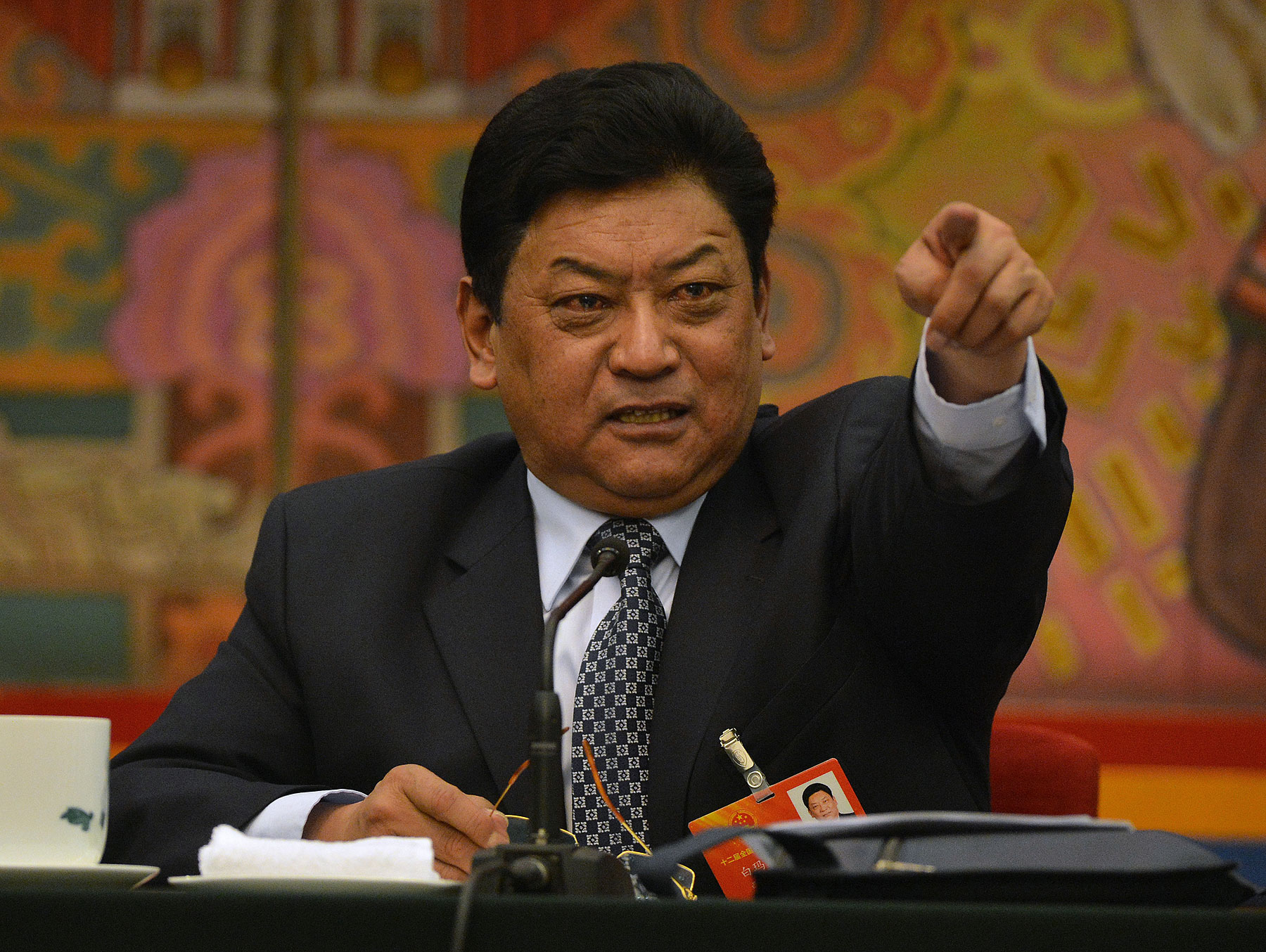
Don’t be fooled by all those foreign news reports and incendiary images leaked at the risk of imprisonment. At the National People’s Congress (NPC) annual confab currently underway in Beijing, Padma Choling, one of the highest-ranking Tibetan officials in China, said that no self-immolations by locals have taken place under his watch. Exile groups and human-rights watchdogs say at least 125 Tibetans have set themselves on fire since 2009 to protest Chinese state repression.
Most self-immolators have using their final moments of life to call for the return of the Dalai Lama, the Tibetan spiritual leader who has lived in exile for more than five decades after a failed uprising back home. The Chinese government blames the Dalai Lama for orchestrating the fiery protests, a charge the 78-year-old monk denies.
“None of the 46,000 monks and nuns in Tibet’s 1,700-plus monasteries, nor any local residents, have self-immolated,” said Padma Choling, a former soldier who is the chairman of the Standing Committee of the People’s Congress of the Tibet Autonomous Region (TAR). This is not the highest-ranking political position in Tibet; that top post has never gone to a Tibetan, one of the many power gaps felt keenly by some locals.
Technically, Padma Choling is close to right on the self-immolations. Nearly all of the incendiary acts have taken place not in the TAR that he helps command but in ethnically Tibetan areas of three other Chinese provinces: Sichuan, Qinghai and Gansu. And the Tibetan official was careful to stress that no TAR locals were involved, leaving open the possibility of other Tibetans coming to the TAR to self-immolate. At another high-level meeting in Beijing in 2012, Che Dalha, the Communist Party Secretary of the TAR’s capital Lhasa, noted that “only a few cases have happened in the Tibetan Autonomous Region.” Overall, Padma Choling seemed determined to gloss over the situation across the Tibetan high plateau. Locals complain of state-imposed religious restrictions and an influx of migrants from China’s Han ethnic majority, who tend to secure the best jobs.
Padma Choling’s cheery estimation of his homeland isn’t unusual among party officials. At the 2012 Chinese Communist Party Congress, another senior Tibetan official claimed that a nationwide poll had deemed Lhasa the happiest city in China for four years. Since 2008 race riots claimed at least 100 Tibetan and Han lives, Lhasa has turned into perhaps the most militarized city in all of the People’s Republic, with constant checkpoints and security personnel patrolling the streets. Riot gear, armored vehicles, paramilitary forces—is this really what such a happy metropolis should feel like? In its latest human-rights report, the U.S. government said that nearly 90 people had been jailed in connection with the self-immolations. Some were locked up simply for having been related to the protesters.
In recent weeks, the Chinese government’s pr campaign has intensified against the Dalai Lama and other people it occasionally calls “splittists.” The Dalai Lama has for decades advocated a “middle way” that forswears outright Tibetan independence in exchange for meaningful autonomy. On March 10 at the NPC, China’s top political advisor Yu Zhengsheng said that “efforts should be made to help local officials and people get a clear understanding of the nature and danger of the Dalai Lama’s preaching of the ‘middle way’ and ‘high-degree autonomy,’” according to state news agency Xinhua.
Yu’s criticism felt rather feeble compared to other broadsides unleashed by Chinese government representatives. Commenting on the Tibetan spiritual leader’s U.S. tour — during which he met last month with U.S. President Barack Obama at the White House — Chinese Foreign Ministry Spokesman Qin Gang said the encounter “grossly interfered in China’s internal affairs.” Qin went on to assail the Dalai Lama. “Facts have fully proved that the Dalai Lama is by no means a pure religions figure,” he said, “but a political exile who has long been engaged in anti-China separatist activities under the cloak of religion.” At least that was a tad more polite than when Chinese officials referred to the Tibetan cleric as a “wolf in monk’s robes.”
On March 4, the Dalai Lama led a prayer session at the U.S. Senate. China, again, expressed displeasure. Yet there’s no question that the Dalai Lama’s long decades of exile have not dulled Tibetan reverence for him. His image, technically illegal, often resides in the photos kept on Tibetan cellphones. This month, a memoir by the former guerilla commando who founded Tibet’s Communist Party was published in Hong Kong. The book is entitled A Long Way to Equality and Unity and in it, Bapa Phuntso Wangye (also known as Phunwang), 92, makes an extraordinary plea: He wants the Chinese government to allow the Dalai Lama to return home.
More Must-Reads from TIME
- Why Trump’s Message Worked on Latino Men
- What Trump’s Win Could Mean for Housing
- The 100 Must-Read Books of 2024
- Sleep Doctors Share the 1 Tip That’s Changed Their Lives
- Column: Let’s Bring Back Romance
- What It’s Like to Have Long COVID As a Kid
- FX’s Say Nothing Is the Must-Watch Political Thriller of 2024
- Merle Bombardieri Is Helping People Make the Baby Decision
Contact us at letters@time.com